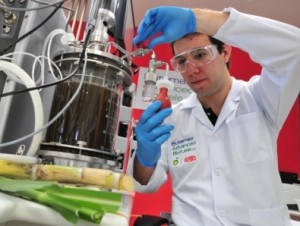Butamax has received another patent from the U.S. Patent and Trademark Office (USPTO) number 7,910,342 entitled “FERMENTIVE PRODUCTION OF ISOBUTANOL USING HIGHLY ACTIVE KETOL-ACID REDUCTOISOMERASE ENZYMES.” The patent was awarded to protect a key step in the company’s biobutanol production pathway using genetic constructs with highly active enzymes. This is one of several patents that Butamax has been awarded for its biobutanol production technology.
 “We pioneered microbial production of isobutanol as a single fermentative product and we are pleased that the U.S. patent office has recognized our inventive contributions in this field again,” said Tim Potter, Butamax CEO. “This patent protected technology is important because it enables commercially viable production rates.”
“We pioneered microbial production of isobutanol as a single fermentative product and we are pleased that the U.S. patent office has recognized our inventive contributions in this field again,” said Tim Potter, Butamax CEO. “This patent protected technology is important because it enables commercially viable production rates.”
Just last December, Butamax was awarded a patent that covered various recombinant microorganisms, including yeast host cells, expressing classes of enzymes that catalyze the metabolic pathway for producing biobutanol at commercial scale. According to the company, the patent also protects methods for producing biobutanol as well as the fermentation medium in which the biobutanol is produced.
Butamax Vice President and Chief Counsel, Christine Lhulier, said, “We are the only company to hold issued patents for this technology. By obtaining and protecting our intellectual property portfolio, we ensure the highest sustainable value for our customers and licensees. Because our technology is not dependent on on-going royalties to multitudes of third party technology providers, Butamax is able to provide higher financial returns for converting ethanol capacity to biobutanol production.”
Lhulier also noted that Butamax is the only company to own all of its intellectual property. She said they are also the only company that can offer ethanol producers a technology that is clear of third party rights and obligations.
“We are uniquely positioned to provide unfettered access to the most advanced technology for producing biobutanol. We will continue to secure for our customers and licensees the ability to modify their production capacity to ensure sustainable growth for the biofuels industry,” concluded Lhulier.

